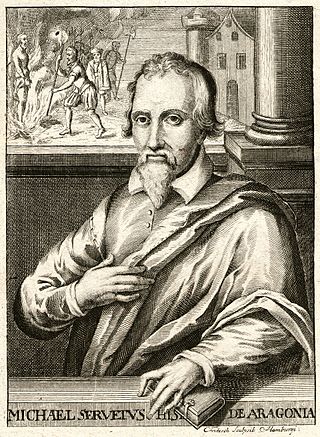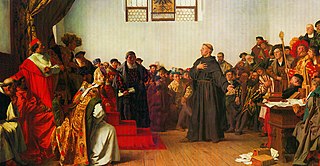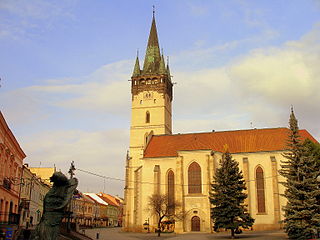Related Research Articles

The Council of Trent, held between 1545 and 1563 in Trent, now in northern Italy, was the 19th ecumenical council of the Catholic Church. Prompted by the Protestant Reformation at the time, it has been described as the embodiment of the Counter-Reformation.

Pope Paul IV, born Gian Pietro Carafa was head of the Catholic Church and ruler of the Papal States from 23 May 1555 to his death in August 1559. While serving as papal nuncio in Spain, he developed an anti-Spanish outlook that later coloured his papacy. In response to an invasion of part of the Papal States by Spain during his papacy, he called for a French military intervention. After a defeat of the French and with Spanish troops at the edge of Rome, the Papacy and Spain reached a compromise: French and Spanish forces left the Papal States and the Pope thereafter adopted a neutral stance between France and Spain.

Michael Servetus was a Spanish theologian, physician, cartographer, and Renaissance humanist. He was the first European to correctly describe the function of pulmonary circulation, as discussed in Christianismi Restitutio (1553). He was a polymath versed in many sciences: mathematics, astronomy and meteorology, geography, human anatomy, medicine and pharmacology, as well as jurisprudence, translation, poetry, and the scholarly study of the Bible in its original languages.

The Diet of Worms of 1521 was an imperial diet of the Holy Roman Empire called by Emperor Charles V and conducted in the Imperial Free City of Worms. Martin Luther was summoned to the Diet in order to renounce or reaffirm his views in response to a Papal bull of Pope Leo X. In answer to questioning, he defended these views and refused to recant them. At the end of the Diet, the Emperor issued the Edict of Worms, a decree which condemned Luther as "a notorious heretic" and banned citizens of the Empire from propagating his ideas. Although the Protestant Reformation is usually considered to have begun in 1517, the edict signals the first overt schism.

In the scholastic system of education of the Middle Ages, disputations offered a formalized method of debate designed to uncover and establish truths in theology and in sciences. Fixed rules governed the process: they demanded dependence on traditional written authorities and the thorough understanding of each argument on each side.
Protestantism originated from the Protestant Reformation of the 16th century. The term Protestant comes from the Protestation at Speyer in 1529, where the nobility protested against enforcement of the Edict of Worms which subjected advocates of Lutheranism to forfeit of all their property. However, the theological underpinnings go back much further, as Protestant theologians of the time cited both Church Fathers and the Apostles to justify their choices and formulations. The earliest origin of Protestantism is controversial; with some Protestants today claiming origin back to people in the early church deemed heretical such as Jovinian and Vigilantius.

Francisco de Quiñones, O.F.M., was a Spanish Franciscan friar and later cardinal who was responsible for some reforms in the Catholic Church in Spain.

The history of the Calvinist–Arminian debate begins in early 17th century in the Netherlands with a Christian theological dispute between the followers of John Calvin and Jacobus Arminius, and continues today among some Protestants, particularly evangelicals. The debate centers around soteriology, or the study of salvation, and includes disputes about total depravity, predestination, and atonement. While the debate was given its Calvinist–Arminian form in the 17th century, issues central to the debate have been discussed in Christianity in some form since Augustine of Hippo's disputes with the Pelagians in the 5th century.

Lutheranism as a religious movement originated in the early 16th century Holy Roman Empire as an attempt to reform the Roman Catholic Church. The movement originated with the call for a public debate regarding several issues within the Catholic Church by Martin Luther, then a professor of Bible at the young University of Wittenberg. Lutheranism soon became a wider religious and political movement within the Holy Roman Empire owing to support from key electors and the widespread adoption of the printing press. This movement soon spread throughout northern Europe and became the driving force behind the wider Protestant Reformation. Today, Lutheranism has spread from Europe to all six populated continents.
Spiritual formation may refer either to the process and practices by which a person may progress in one's spiritual or religious life or to a movement in Protestant Christianity that emphasizes these processes and practices. The processes may include, but are not limited to,

The Cavite mutiny was an uprising of Filipino military personnel of Fort San Felipe, the Spanish arsenal in Cavite, Philippine Islands on January 20, 1872. Around 200 locally recruited colonial troops and laborers rose up in the belief that it would elevate to a national uprising. The mutiny was unsuccessful, and government soldiers executed many of the participants and began to crack down on a burgeoning Philippines nationalist movement. Many scholars believed that the Cavite mutiny was the beginning of Filipino nationalism that would eventually lead to the Philippine Revolution of 1896.

Heresy in Christianity denotes the formal denial or doubt of a core doctrine of the Christian faith as defined by one or more of the Christian churches.

The doctrine of the Trinity, considered the core of Christian theology by Trinitarians, is the result of continuous exploration by the church of the biblical data, thrashed out in debate and treatises, eventually formulated at the First Council of Nicaea in AD 325 in a way they believe is consistent with the biblical witness, and further refined in later councils and writings. The most widely recognized Biblical foundations for the doctrine's formulation are in the Gospel of John, which possess ideas that originate in Platonism and Greek philosophy.

The Tyndale Bible (TYN) generally refers to the body of biblical translations by William Tyndale into Early Modern English, made c. 1522–1535. Tyndale's Bible is credited with being the first Bible translation in the English language to work directly from Hebrew and Greek texts, although it relied heavily upon the Latin Vulgate. Furthermore, it was the first English biblical translation that was mass-produced as a result of new advances in the art of printing.
This timeline of antisemitism chronicles events in the history of antisemitism, hostile actions or discrimination against Jews as members of a religious and/or ethnic group. It includes events in Jewish history and the history of antisemitic thought, actions which were undertaken in order to counter antisemitism or alleviate its effects, and events that affected the prevalence of antisemitism in later years. The history of antisemitism can be traced from ancient times to the present day.

In 16th-century Christianity, Protestantism came to the forefront and marked a significant change in the Christian world.

Protestantism is a branch of Christianity that follows the theological tenets of the Protestant Reformation, a movement that began in the 16th century with the goal of reforming the Catholic Church from perceived errors, abuses, and discrepancies.

Jacob Palaeologus or Giacomo da Chio was a Dominican friar who renounced his religious vows and became an antitrinitarian theologian. A polemicist against both Calvinism and Papal Power, Palaeologus cultivated a wide range of high-placed contacts and correspondents in the imperial, royal, and aristocratic households in Eastern Europe and the Ottoman Empire; while formulating and propagating a radically heterodox version of Christianity, in which Jesus Christ was not to be invoked in worship, and where purported irreconcilable differences between Christianity, Islam, and Judaism were rejected as spurious fabrications. He was continually pursued by his many enemies, repeatedly escaping through his many covert supporters.

Proto-Protestantism, also called pre-Protestantism, refers to individuals and movements that propagated ideas similar to Protestantism before 1517, which historians usually regard as the starting year for the Reformation era. The relationship between medieval sects and Protestantism is an issue that has been debated by historians.
Catholic–Protestant relations refers to the social, political and theological relations and dialogue between the Catholics and Protestants.
References
- ↑ Last and Near-Last Words of the Famous, Infamous and Those In-Between By Joseph W. Lewis Jr. M.D.